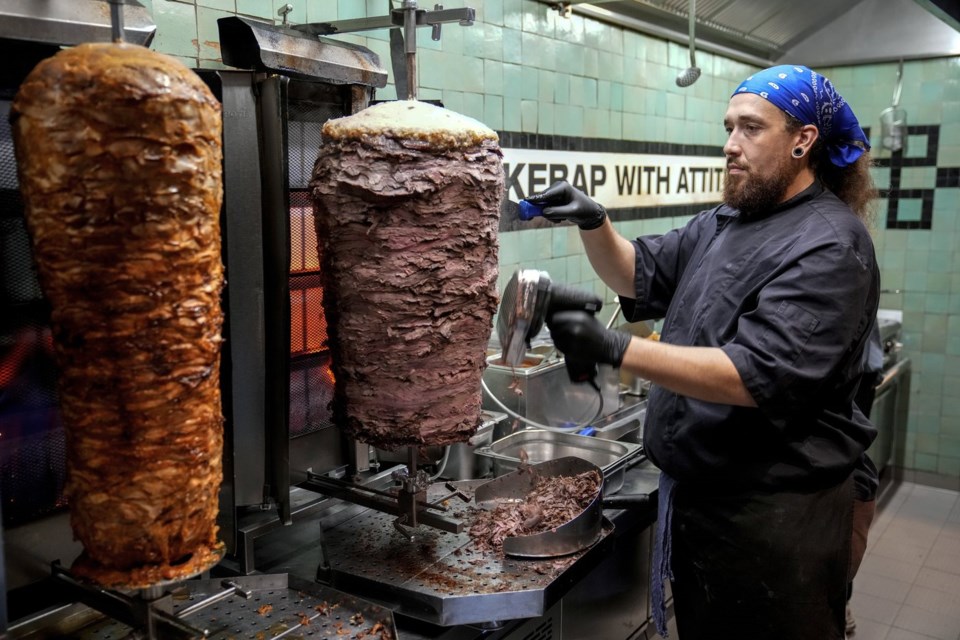BERLIN (AP) — Germans are in kebab angst.
They worry that their most beloved street food option, the spicy, juicy kebab in a pita that can be found on every street corner across Germany, may get more expensive — or even worse, that the country may be sliding into a national kebab shortage.
Even if these fears may sound exaggerated at first, they aren't unfounded. Workers at one of Germany's biggest kebab factories are locked in a bitter and ongoing fight with their employer over wages and working conditions.
For weeks, workers at the Birtat Meat World SE factory in southwestern Germany have repeatedly stopped the production line by walking off their jobs in "warning strikes,” demanding wage increases of 375 euros ($434) per month.
Their current salaries vary widely, and haven't been disclosed. The Food, Beverages and Catering Union that represents them says that payment methods are nontransparent and workers are making vastly different salaries for the same kind of job, according to German news agency dpa.
Workers are also trying to organize a collective contract agreement for all employees with the help of the union.
Immigrant workers
Many workers are immigrants from Turkey, Romania or Bulgaria, who spend long, tough workdays in the factory, which has near freezing temperatures to keep the raw meat fresh.
On Wednesday, many workers walked off their jobs again, waving flags in front of the factory's main gate, playing drums, whistling and shouting for higher salaries and unionized contracts.
German media have reported that Birtat hasn't yielded to any of the demands so far. The company didn't immediately respond to requests for an interview.
Millions of consumers each month
Birtat, which is located in Murr, 30 kilometers (nearly 20 miles) north of Stuttgart, has been making kebab skewers for more than 30 years. The company says on its website that it makes skewers of ground beef, veal, chicken or turkey kebab that can weigh up to 120 kilograms (260 pounds).
The workers chop up the meat, marinate it and push chunks of the raw produce on long metal skewers. The meat is then shock-frozen and and delivered to restaurants all over the country.
Birtat says it supplies thousands of kebab stands and fast food places and reaches more than 13 million consumers every month. Some restaurant owners worry that should the workers decide to go on a long-term strike, the Germans' favorite fast-food snack may indeed become more expensive or even scarce.
Rising prices
Germans already complain that the meaty snack, which used to be a cheap staple that sold for 2.50 euros about two decades ago, has become too expensive, with most places charging at least 7 euros ($8) or more.
Halil Duman was pondering the state of the kebab business as he was busy slicing off thin pieces of ground beef at Pergamon Döner, a small eatery at Berlin’s Friedrichstrasse train station where people were lining up for lunch.
“It's all getting more and more difficult," the 68-year-old Turkish immigrant said. "The produce is becoming more expensive and we barely make profit anymore.”
“But if we raise the prices any further, people won't buy here anymore,” said Duman, who has been working at kebab stores in the German capital for more than 30 years and was selling the classic kebab sandwich for 7.50 euros (around $8.70).
History of the kebab in Germany
Germans have long fancied the kebab sandwich, which is called a döner in Germany. The word comes from the Turkish verb “donmek,” meaning to turn — the meat is grilled for hours on a spit and cut off in razor-thin slices when it's crisp and brown.
First brought to Berlin by Turkish immigrants in the 1970s, the grilled meat snack, which comes wrapped in pita bread with shredded lettuce, tomatoes, onions and different dressings, is now sold everywhere in Germany, from regions stretching from the Baltic Sea to the Bavarian Alps.
According to legend, it was Mahmut Aygun, a Turkish guest worker, who invented the first döner sandwich in 1971, when he sold the meat in a piece of pita bread with yogurt dressing at a stand close to a main train station next to the zoo in West Berlin.
About 2.9 million people with Turkish roots live in Germany — but the döner kebab sandwich has become so ubiquitous in the country that many foreign tourists consider it typically German and don't even know about the snack's immigrant past.
Nele Langfeld, a 22-year-old university student, had come to Pergamon Döner because she was craving the yummy comfort food after having just finished an exam.
Waiting in line for her turn, she said that while she hadn't heard about the labor dispute at Birtat, she sure didn't like the prospect of a possible döner shortage or higher prices.
“I live on a budget and that's the last thing I need,” she said. “Döner is the one affordable meal that really fills your stomach — it should stay that way.”
Kirsten Grieshaber, The Associated Press




